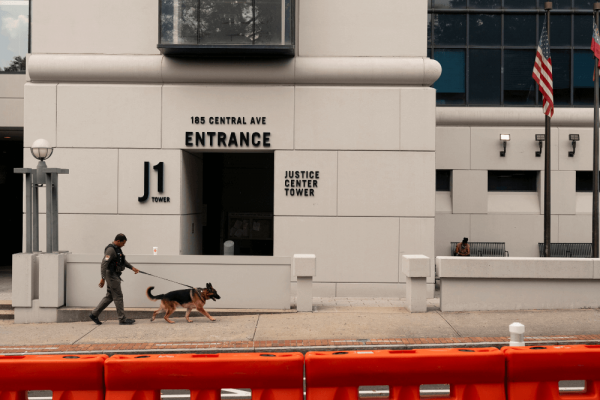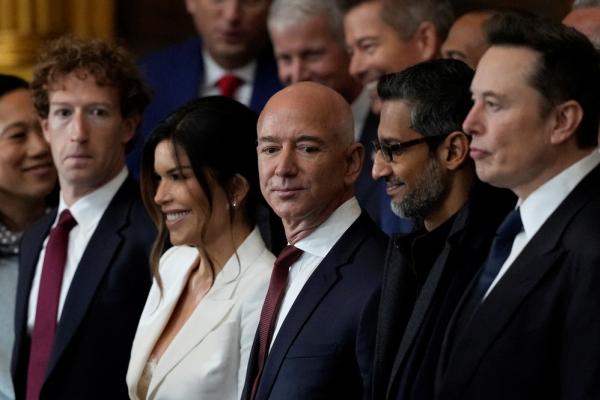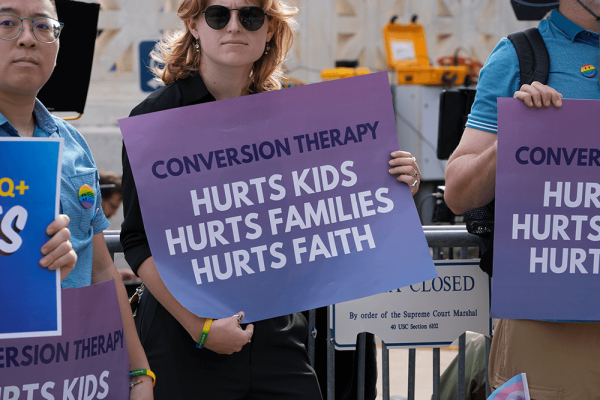Former president Donald Trump has now been indicted four times — the only indictments of a former president in our nation’s history. Most recently, a Georgia grand jury indicted Trump and 18 “co-conspirators” for engaging in a “criminal enterprise” that sought to overturn Trump’s electoral loss in the state in the 2020 presidential election.
There’s plenty that concerns me about this latest indictment, including 161 specific acts prosecutors say were intended to obstruct the election, ranging from harassment of election officials to the infamous recorded phone call where Trump tells Georgia’s secretary of state to “find” missing votes. But what’s most bothering me aren’t the details of the indictment; I’m worried that most folks in the U.S., including Christians, are barely paying attention. Meanwhile, Trump remains the front-runner in the the Republican primary, despite the indictments.
I understand the impulse to tune out; according to recent polling, nearly half of the country sees these charges as partisan in nature. Many of these folks likely made up their minds about the election long ago. Trump has been all too effective in playing the victim card, convincing many of his supporters that any attack on him represents an attack on them as well. But even among those of us who do care deeply about the integrity of our democracy, it’s hard to stay engaged. Who really wants constant reminders of the trauma of the insurrection and the continued dangers of election subversion, especially during summer, when many of us take much-needed vacation?
But what I keep coming back to is this: These indictments pose a moral test of our legal system and our democracy. Will we ignore allegations against people with great wealth and great power, including a former president who has become an expert at evading accountability? Or will we hold everyone accountable, ensuring both the defendants and the plaintiffs get a fair trial? And for Christians, it’s also a test of our faith. While it will be up to a jury of our peers to determine guilt and illegality, we must discern for ourselves what we believe is unethical and evil behavior, especially when it poses a threat to our democracy and collective future.
The Georgia indictment in particular strikes at the heart of what lends our democratic system its legitimacy: the right to vote and to have that vote counted. According to the Georgia indictment, “Trump and other Defendants charged in this Indictment refused to accept that Trump lost, and they knowingly and willfully joined a conspiracy to unlawfully change the outcome of the election in favor of Trump.” And though these alleged efforts to undermine the 2020 election failed, public trust in our electoral and judicial system has been weakened as a result: Trump successfully convinced many people in the country that the election was stolen — a pernicious lie that has led many to believe this indictment is merely a political “witch hunt” against the top 2024 Republican contender. So, while it may be tempting to just put the last election behind us, we have to fully reckon with what happened in Georgia (and other states) to prevent future weakening and attacks on our democracy, especially as we approach a new presidential election. This is particularly important given three new laws recently passed by the state legislature in Georgia that, according to advocacy groups like the Brennan Center, increase the “risk of partisan interference with elections and election results.”
Under our system of justice, defendants are presumed innocent until proven guilty, and that must be afforded to Trump and his alleged co-conspirators’ as well. But that doesn’t mean we should ignore the substantial evidence of their wrongdoing that is already in the public domain. At the trial, each side will have to wrestle with the nature, intent, and context of these actions. I strongly believe that as Christians we have a duty to wrestle with these same questions, both within ourselves and in conversation with other Christians of all political persuasions, especially those who may have a different perspective than we do.
Here’s a few issues we must grapple with and points we can make to fellow Christians who are inclined to tune out from the Georgia proceedings.:
- The Georgia indictment is directly tied to safeguarding the future of our democracy. Because he has been charged under state rather than federal law, Trump will not have the power to pardon himself or make the case go away were he to win the presidency next fall; depending on what happens in the case, we could face a situation where a sitting U.S. president is found guilty and sentenced to prison time or elected while already in prison. It’s not clear what would happen in this situation, but it would raise profound questions about principles of democracy and heighten the threat of political violence. The proceedings, which will likely be televised, will tell a detailed story of how Trump and his co-conspirators allegedly engaged in conspiratorial actions to overturn the election results and in the process disenfranchise voters. As Christians, we are called to be peacemakers and to protect the imago dei of every voter — both of which will be called for as this case continues to unfold in the coming months.
- Tuning out from the Georgia case is a privilege that some can’t afford. It is critical to surface some of the racial dynamics at play in the Georgia case. The indictment was led by District Attorney Fani Willis, who, as a Black woman, has faced years of death threats from angry Trump supporters simply for conducting this investigation, let alone moving forward with this week’s indictment. Ruby Freeman and her daughter, two former Georgia poll workers, were forced to go into hiding after Rudy Giuliani made false claims that they had rigged the election. The state of Georgia also has a long and sordid history of suppressing the votes of its Black residents — whose vote was critical to Biden’s 2020 victory in the state. The alleged offenses in the indictment represent a coordinated effort to disenfranchise the Black voters of the state who voted overwhelmingly against Trump’s reelection. If we believe that every human being is made in the image of God, we can’t ignore a case that has resulted in physical threats and efforts to disenfranchise Black voters.
- These criminal indictments are about criminal actions, not free speech. Both with the federal indictment and the Georgia indictment, Trump’s lawyers will likely build their defense largely around the argument that Trump and other co-defendants had the right to express their opinions and raise concerns about the election. This argument is a deflection: Trump and others concerned about the integrity of the 2020 election did have a right to contest the results in Georgia, but in more than 60 court rooms across the country, judges found no evidence of wrongdoing. What’s really at stake in these indictments is the degree to which Trump and his co-defendants committed criminal actions — not to question, but to actually overturn the results through coercion, intimidation, tampering with voting machines, recruiting a group of false electors, and more. All this falls squarely outside their right to free speech and right to contest the results in court. These indictments and trials can help break the fever of Republican politicians who continue to defend and rationalize Trump’s actions that were at the very least unethical.
The book of Proverbs reminds us that “a truthful witness saves lives, but he who utters lies is treacherous” (14:25). The Book of Psalms admonishes: “No one who practices deceit will dwell in my house; no one who speaks falsely will stand in my presence (101:7).” Both are timeless warnings about the corrosive evil of lies and our Christian responsibility to seek and act on the truth. While far from perfect, trials at their best are a vehicle for surfacing and acting on the truth. Through these trials our nation has an opportunity and responsibility to get closer to the truth, and juries will have the civic responsibility to hold Trump and others accountable if evidence points to their guilt beyond a reasonable doubt. This is not a time to remain silent as our nation grapples with these indictments, particularly as they come to trial in the midst of an extremely contentious election season. As the church, we must continually raise the deeper moral questions that are at stake and help provide people with the tools to seek and act on the truth. Whatever the outcome of these trials, the church has a sacred responsibility to seek and act on the truth and be at the forefront of efforts to defend and strengthen our democracy as a faith imperative.
Got something to say about what you're reading? We value your feedback!






